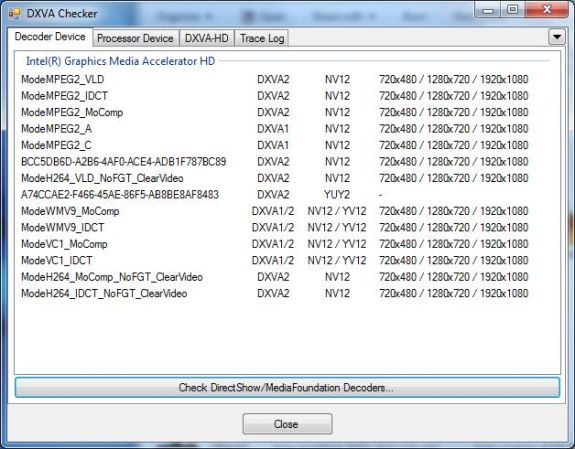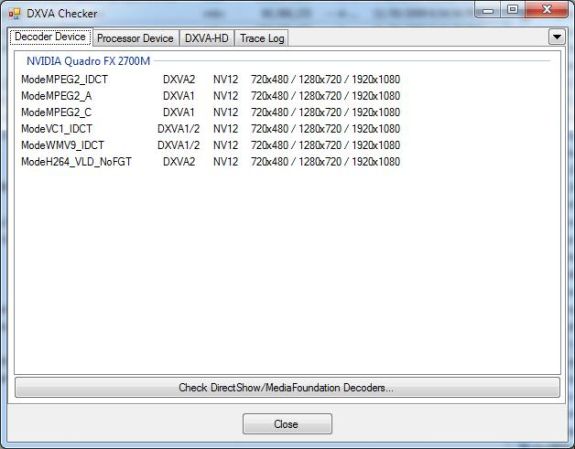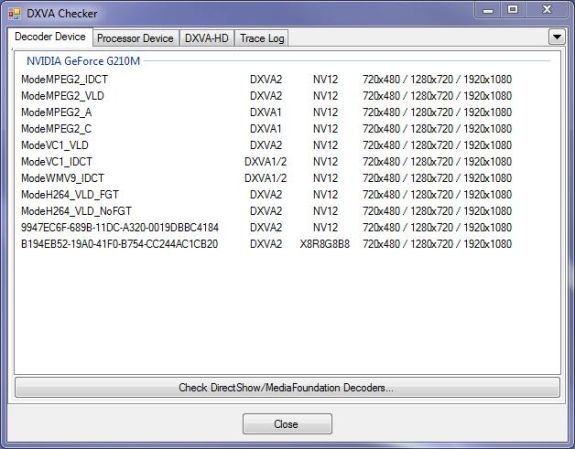HD Video Decoding on GPUs with VLC 1.1.0
by Ganesh T S on June 25, 2010 4:35 AM EST- Posted in
- Home Theater
- HTPC
Catalyst 10.6 does not provide any support for VLC's GPU acceleration methodology, but AMD seems to suggest that a update to fix this is coming soon. Knowing ATI's lethargy in fixing drivers for anything not related to gaming, we decided to ignore their GPUs for the time being.
[UPDATE 1: June 26, 2010: We heard back from AMD PR as well as the concerned VLC developer, and we are told that Catalyst 10.7 (expected by mid-July), and VLC 1.1.1 (expected in 3 - 4 days) enable acceleration on ATI GPUs also. Apparently, they have verified that the acceleration works in the labs, and are waiting on final QA. I am now willing to reconsider my earlier opinion on ATI's lethargy and hope that this sort of response is a sign of good things to come for AMD/ATI HTPC users.]
[UPDATE 2: July 2, 2010: AMD provided us with the pre-release Catalyst 10.7, and Jean-Baptiste gave us the VLC 1.1.1 build. On one of AMD's recent Radeon chipsets, GPU acceleration works better than Nvidia's. Also, it looks likely that Radeon 3xxx users will be unable to take advantage of VLC's acceleration. More details will follow once Catalyst 10.7 is officially released].
VLC developers couldn't test their acceleration methodology on the Intel IGPs at all. As end users, we decided to test it out for them.
We utilized 3 test beds for our evaluation
1. Intel IGP - Arrandale ClearVideo: Gateway NV5935u
2. Nvidia - Quadro FX2700M PureVideo VP2: Customised HP 8730w [ Core 2 Duo T9400 / 4GB RAM ]
3. Nvidia - GeForce G210M PureVideo VP4: Sony Vaio VPCCW13FX/R [ PDF ]
The DXVA capabilities of each platform are evident in the screenshots below.
All machines were tested using VLC 1.1.0 on Microsoft Windows 7, using a 37" Toshiba Regza HDTV connected via HDMI through an Onkyo TX-SR606, at 1920x1080p resolution in Extend mode (with the primary screen running at 1366x768). One set of tests was run with GPU acceleration disabled, and another with GPU acceleration enabled. CPU usage was tracked for both runs and the maximum values over the course of playback compared.
GPU acceleration has been provided by VLC for MPEG-2, H.264 and VC-1. Since MPEG-2 is easily handled by even low performance processors, we decided to cover only H.264 and VC-1 in our test suite. Eight different streams were tested, with the following characteristics
1. L4.1 H.264 1080p30 @ 8.3 Mbps (M2TS)
2. L4.1 H.264 1080p24 @ 10.2 Mbps (MKV)
3. L5.1 H.264 1080p60 @ 10 Mbps - 8 reference frames (MKV)
4. L5.1 H.264 1080p24 @ 19 Mbps - 16 reference frames (MKV)
5. VC-1 Main Profile 1080p24 @ 8 Mbps (WMV9)
6. VC-1 Advanced Profile 1080p24 @ 18 Mbps (MKV)
7. VC-1 Advanced Profile 1440 x 576 @ 6 Mbps (WMV)
8. VC-1 Advanced Profile 720p60 @ 15 Mbps (WMV)
We decided not to use any interlaced media in the test suite since VLC does the deinterlacing on the CPU using SSE2 instructions even if GPU acceleration is enabled. This ensures that deinterlaced media playback remains consistent across different cards and driver versions.
The GPU acceleration support provided by VLC on Windows has a very different architecture compared to the one used by programs such as MPC-HC and Windows Media Player. As explained by one of the developers here, VLC prefers a slower method of GPU acceleration in order to maintain the framework aspect. It decodes on the GPU but gets the decoded data back for further processing. Therefore, CPU usage would be worse off when compared with playback using MPC-HC or Windows Media Player. For this reason, the only comparisons we make further down in this piece are within VLC (acceleration on vs. acceleration off), and not with other media playback programs.













74 Comments
View All Comments
ganeshts - Friday, June 25, 2010 - link
Software able to use multiple cores are better off, as you rightly observe.However, we just saw how VLC had to use 100% of the CPU to decode some of the HD videos.
For the non-technology folks, VLC is probably the only media player installed by whoever set up the computer for them. If they try to see HD videos, they are going to hit issues with CPU usage. VLC's GPU acceleration is meant for people like them :)
fabarati - Friday, June 25, 2010 - link
Using ffdshow tryouts that came with CCCP (from 2008 at that), i could decode almost all 720p files at 1.2 GHz (on a 2.4 Ghz T7700). At 2.4 GHz I could take on any 1080p file, including a massive 24 GB rip of The Godfather.Now I have it set up to run DXVA first, then a fairly recent FFdshow tryout, with the h.264 decoder on MT.
fabarati - Friday, June 25, 2010 - link
(no Edit)When I was using coreavc (1.9.0), i could take on nearly any 1080p file at 1.6GHz, and that beastly godfather rip at 2 GHz.
0roo0roo - Friday, June 25, 2010 - link
well no once again, if you install vlc on a n00bs computer, they are simply not likely to run a raw bluray rip. they are neither going to download or know how to get their hands on such a file of massive proportions. any web rip or youtube type ripped 1080p files or apple trailers are FAR easier to playback than bluray. playing back those on even an older dual core is easy as pie.That being said, somethings wrong with the 100% usage thing. even with software players based on anandtechs own 2006 article an e6700 2.6ghz could playback bluray in software. and that was back when chips were both slower, and the software decoders far less efficient. or perhaps vlc is just not that efficient at bluray.
ganeshts - Friday, June 25, 2010 - link
High-Def is becoming more and more popular. A n00b will probably get MKVs from friends on a USB drive and expect to play it back couple of years down the line ( maybe, even right now :) )The 100% usage is because VLC is pretty crappy and uses a single threaded implementation to decode when GPU is not enabled. Also, the streams are pretty taxing (16 reference frames , 60 frames per second and so on).
Also, I would mention that having 'trouble' with CPU decoding might mean dropped frames, stutters, sudden spikes in CPU usage and kicking in of the CPU fan etc. etc.
0roo0roo - Friday, June 25, 2010 - link
yea but those "mkv"' are at a fraction of the original blurays bitrate, and thus easier to play, at most they are 12gb or so, and those are more rare, the more common 1dvd size or 2 dvd rips easily play even on a 2ghz core 2. i know, i've tried this before. and even that is really not common usage for a true n00b who will at best run apple trailers, and those don't use vlc.ganeshts - Friday, June 25, 2010 - link
It is just not the bit rate, right? Actually, more than the bit rate, it is other encoding characteristics such as reference frames which are the issue in a PC. (On a PMP with hardware acceleration, it is the other way round). Most PCs have more than enough bandwidth to handle high bit rate scenes, but the CPU intensive calculations are what causes the spikes in CPU usage and stutters (I am trying to find some information about which part of the decode process consumes most time in CPU based decoding.. Let me know if you find any thing relevant !)VLC's development motto, I feel, is that they should be able to play back anything and everything perfectly. From that viewpoint, it makes sense for them to develop GPU accelerated playback, though their primary target audience might not make use of it :)
0roo0roo - Friday, June 25, 2010 - link
stuff like global hot keys/multimedia kb support have sat in the interface broken for years now while they play iwth other stuff.. Its just kind of annoying.legoman666 - Friday, June 25, 2010 - link
Can you compare the HD decoding performance of VLC, WMP, MPC-HC and other software? I'd do it myself, but I have an ATI card ;)mindbomb - Friday, June 25, 2010 - link
i can tell you what the results would be.WMP 12 would have the lowest cpu usage, followed closely by mpc hc, and vlc would be in last by a large margin.